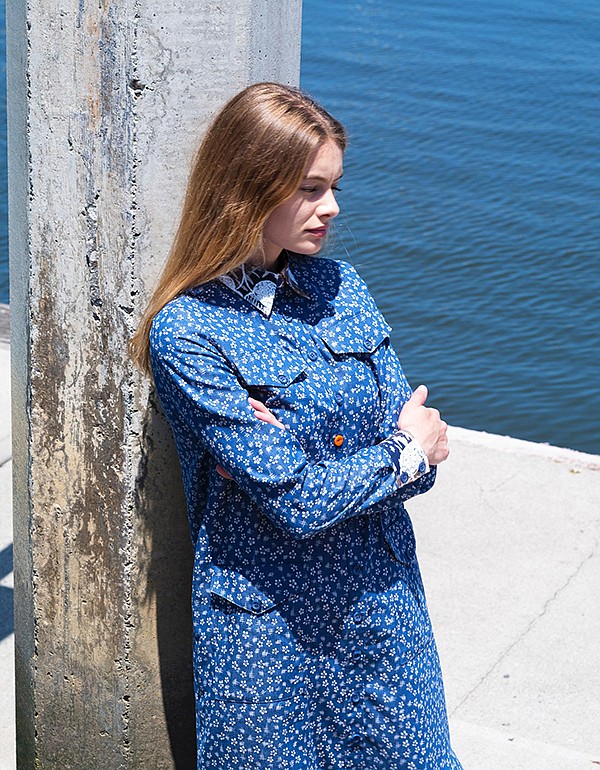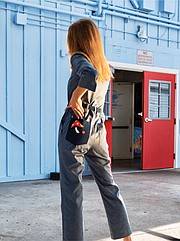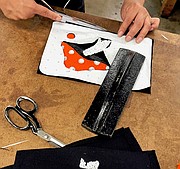RECK-LESS RESPONSIBILITY
Responsible Sourcing Is the Foundation for the California-made Brand Reck-less October 18, 2019
Increasingly, new and emerging brands are searching for supply-chain options that are outside of the big-box model. For Reck-less founder Kertu Palo, this meant taking seemingly simple shirt-dress and jumpsuit designs but recreating them in different upcycled and dead-stock textiles in a variety of colorways for a sustainable approach to manufacturing in California.
“I’ve always cared about sustainable fashion,” Palo said. “What we wear and how it affects lives and society are important to me, so my pieces are made in L.A.”
Originally from Estonia, Palo hails from an artistic family in which mother and grandmothers knitted, and her father created art as a hobby. She traveled to New York, where she pursued a bachelor of fine arts degree in fashion design from the Fashion Institute of Technology. Following roles with luxury brands including J. Mendel and Carolina Herrera, she relocated to California approximately one year ago and launched Reck-less.
“Luxury is fantastic, creative and fun, but I wanted to create a brand that is available to a broader clientele and is not so prestigious,” Palo explained. “But because of my experience [in the luxury market], I use the same techniques and quality.”
The Reck-less design formula results in jumpsuits that are created in washed denim with a perforated laser cut, a vintage-wash denim, a floral-printed denim, a wrinkled cotton and a plain blue denim. For her shirt-dress designs, Palo wanted to create a lighter-weight garment for easy layering. She offers the piece in a shirt-weight fabric in plaid and a small floral print in different colors.
“I wanted to create something that wasn’t a big collection. I started with two styles—a jumpsuit and a shirt-dress—and wanted to play with the idea,” Palo explained. “It lends itself to so many looks. It’s a challenge to create this type of collection. Creating a shirt and a dress is easy, but to create two styles, pick it apart and see where it takes you is challenging.”
When creating Reck-less, Palo finds that the difference is in her details. Sourcing dead-stock fabrics from sources including Rag Finders of California and vintage notions from the Button Store—both in Los Angeles—she incorporates smaller pieces of fabric to add trim onto her garments, providing a special, unique touch for her customers.
“I use a contrast to mix up the cuff and collar in a different material to make it unique and give a bit of personality. It’s easy to use the dead-stock material for that,” Palo said. “Sometimes you can only find 10 yards. It’s beautiful and you want to use it, but you can’t create a whole garment. It’s perfect for those little details.”
Working with The Evans Group, or TEG, allows Palo to round out her collection, which is produced in Los Angeles in small batches. Smaller, but important, embroidery details are created in India and shipped to the United States through a partnership of which Palo is extremely proud.
“It’s a very specific skill that is carried down between generations. I knew a woman from a luxury embroidery factory who launched a school for women to teach them how to embroider,” Palo said. “It gives them freedom and independence for a hopeful future. They put their skills to work using only recycled and upcycled materials such as leftover beads from other projects.”
In addition to her dresses and jumpsuits, Palo also creates accessories with reclaimed materials. Her collection includes bags that use heavier upcycled canvas and twill, but she applies the same detail-oriented approach to the interiors of these pieces.
“For the linings, I use different colors and patterned fabrics with little flowers or stripes,” she said. “When you open it, it’s beautiful inside.”
As November approaches, Palo is preparing to expand her collection into knitwear with the release of a sweater coat and short pucker sweater. While Palo has relied on a palette that is heavily focused on blues with orange accents, she will reverse the colorway for this collection. The sweater pieces will be created in hues of orange and brown with blue details.
“These can be worn over the jumpsuit and shirt-dress as layered pieces for colder weather,” Palo explained. “It will go very well with the previous collection.”
At the moment, Reck-less is a direct-to-consumer brand, available at reck-less.com with pricing for jumpsuits and shirt-dresses ranging from $440 to $495, approximately $100 for jewelry, $200 to $325 for bags and $300 to $400 for the upcoming sweater collection. While Palo recognizes her collection is a bit pricy, she believes consumers will view Reck-less as an investment when they consider the ecologically sound, ethical supply chain on which the handmade brand relies.
“It is not simply a number—it’s the quality materials and the workmanship, and the people involved are paid fairly. It’s about knowing what goes into it,” she said. “It’s something that we should love, not simply another item that is quickly bought and rejected fast. It should be something we can have in our closets for a long time and have a relationship with.”
























